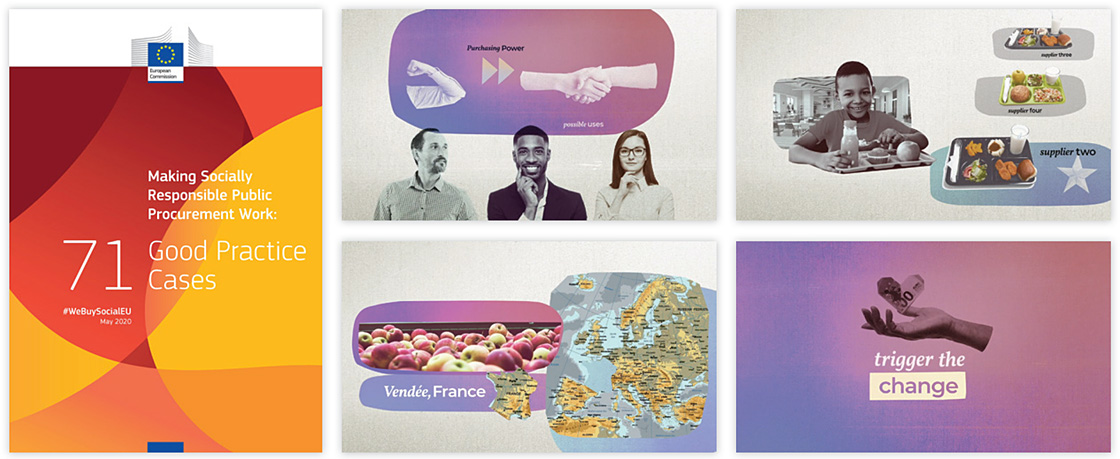In Europe's urban areas, 58% of all greenhouse gas (GHG) emissions can be traced to the use of energy sources used for the functioning of cities' infrastructure, heating, cooling, security and light.
As local and regional authorities have full or partial control over many of these public utilities, they can use the tools at their disposal to reduce their environmental impact. One such tool is public procurement. Public buyers are among the biggest investors in the European single market, spending 2 trillion euro per year on goods, works and services. That gives them a lot of potential to have a positive influence on the broader (energy) market – both on the demand and the supply side – by demanding that suppliers operate in more sustainable or socially responsible ways.
Public authorities use public funds when procuring goods, works and services. The European Union (EU) has created a well-regulated public procurement market founded on the core principles of transparency, equality and open competition to ensure that these funds are not misspent and that tenders are fair. Socially Responsible Public Procurement (SRPP) aims to go one step further and to address the impact on society of the purchases made by the public sector. SRPP is about implementing social or 'green' considerations (when talking about green procurement or sustainable procurement, the latter including both social and green aspects) in public contracts to achieve positive social outcomes.
The European Commission (EC) has recently published the report "Making socially responsible public procurement work: 71 good practice cases". The 71 cases included in the document make the potential of SRPP visible, showing how procurement can affect the broader market. By promoting employment opportunities, decent work, social inclusion, accessibility, design for all, ethical trade, and compliance with social and environmental standards, public buyers can increase demand for "socially responsible" goods, works and services. Public procurers can be especially impactful in sectors where they command a large share of the market, such as construction, healthcare and transport. As public procurers spend around 14% of the EU's gross domestic product (GDP), their power does not stop there. The EC report also contains cases relating to cleaning and facility management, food/catering services, furniture, gardening services, social services, ICT and textiles. The report shows that in many of these sectors public procurers can make interventions that make the energy market more sustainable and drive down GHG emissions.
Traditionally, public procurers have made purchasing decisions by comparing price and quality. The EC report highlights the impact procurers can have when they look beyond these two categories and consider how a product or service is produced or sourced. For example, in France, the Department of Vendée, needing a supplier that would provide food services to schools in the Department’s territory, issued a tender in which the award criteria were based on price, technical quality and environmental services. Consequently, interested tenderers had to show in their offer that the energy sources used to realise these services would be environmentally friendly. To create an additional social impact, the tender was reserved for social enterprises working in agrifood that employed a minimum amount of people with disabilities.
Though there were no geographical requirements in the published tender, the eventual winner was an organisation from Vendée, which proved it could make an environmental impact by providing locally-sourced organic food and reducing transportation distances. The Department of Vendée has estimated that this catering project has led to an annual reduction of 281.59 tonnes of CO2 emissions. Furthermore, the schools do not need to receive the food products on their own: they are delivered through the service of the winning social enterprise. This has reduced the volume of deliveries by two thirds. Vendée estimates that this reduction in transportation will lead to expected primary savings of 1.03 GwH per year. The Department is now considering broadening the programme to include other buyers, such as retirement homes and municipalities. Moreover, it has taken a similar approach to meat and fish procurement.
The Vendée case is a good example of how the future of how SRPP could look like, by showing that it can be a valuable tool to protect both vulnerable people and the environment, through energy savings and emissions reduction. The European Commission has until recently seen Socially Responsible Public Procurement and Green Public Procurement (GPP) as two separate strands of sustainable procurement. In the future, it aims to encourage public authorities to integrate social and green aspects equally in their procurement.
Such developments could make procurement have an even more direct impact on the energy market, for example, when cities are procuring building maintenance services. While most buildings receive scheduled maintenance, different energy needs based on activity levels and actual usage are not always considered. Higher CO2 emissions and higher economic costs are among the major consequences of such ineffi cient maintenance. By effectively employing SRPP when acquiring building maintenance services, procuring authorities can have a major social and environmental impact on their cities and regions, while also decreasing costs. To have an even bigger impact, authorities could also introduce social or environmental considerations when acquiring construction services, to ensure that the constructing company they contract makes the buildings more energy-effi cient and uses more sustainable materials. The EC reports highlights that introducing such social and environmental considerations does not lead to extra costs. In fact, SRPP can often even lead to savings.

What is socially responsible public procurement about?
Watch these videos to learn more.
#WeBuySocialEU – Video about a case in Vendée, France - https://www.youtube.com/watch?v=Sri4Hdd6-cQ
#WeBuySocialEU – Video about a case in the Czech Republic - https://www.youtube.com/watch?v=vGRvf_J3fJ4&t
#WeBuySocialEU – Video about a case in the city of Toledo, Spain - https://youtu.be/Nx6XVjkabZg